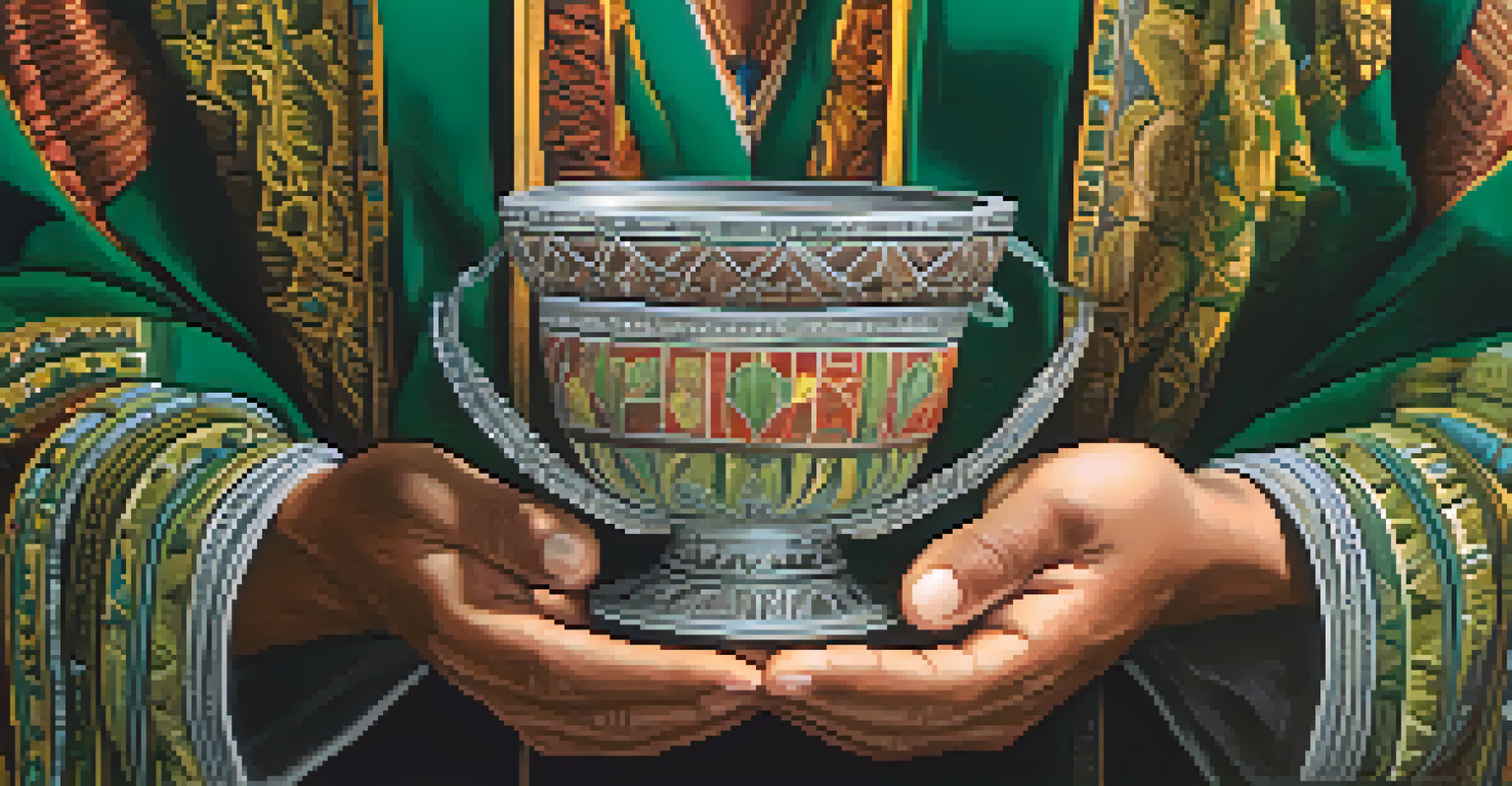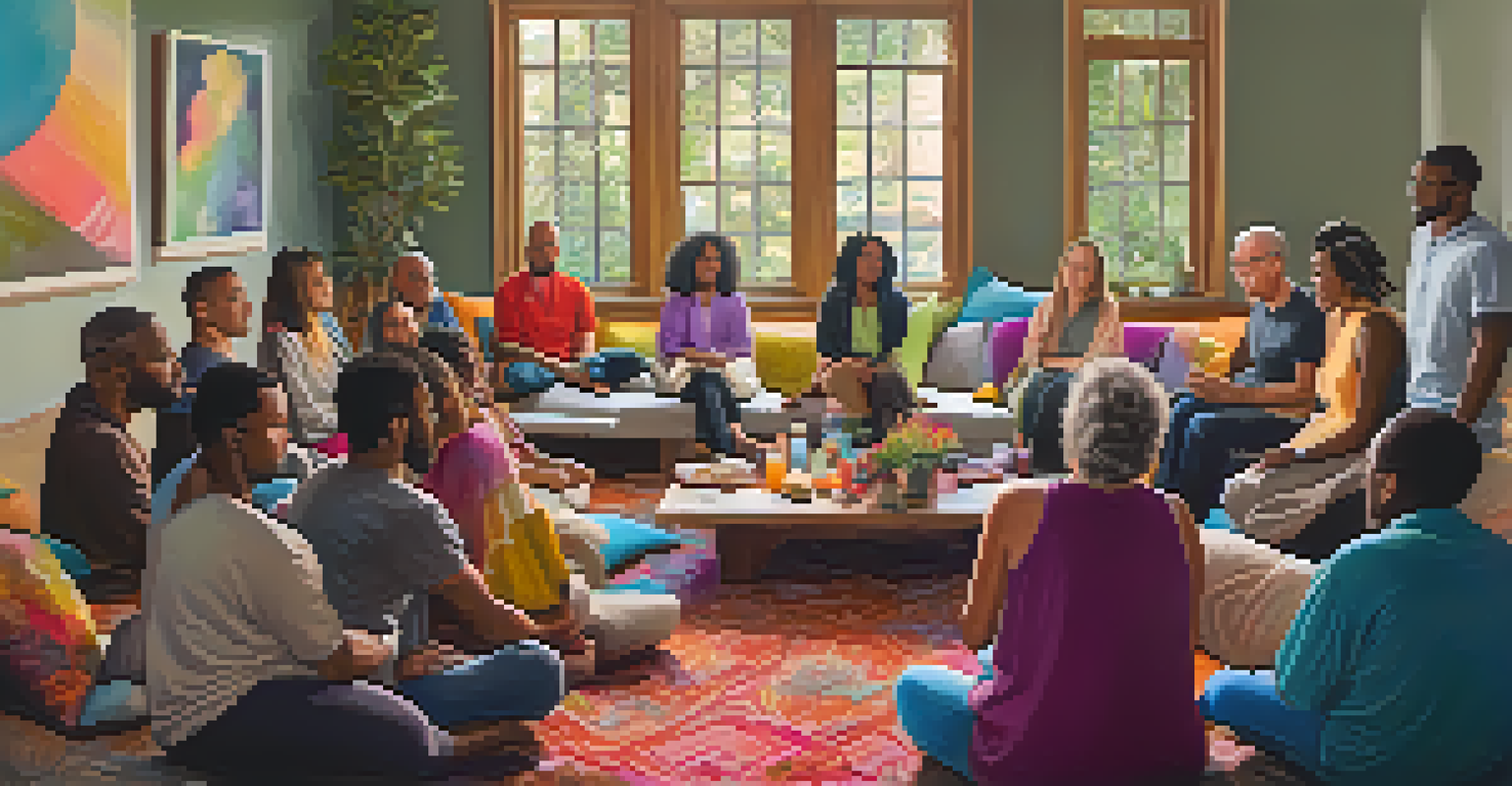Entheogens in Cultural Traditions and Community Life

Understanding Entheogens and Their Historical Roots
Entheogens are substances that often induce altered states of consciousness, typically used in spiritual or religious contexts. Their use can be traced back thousands of years, with cultures around the world employing them to connect with the divine. From the ancient Greeks using mushrooms in their mysteries to indigenous tribes in the Amazon utilizing ayahuasca, these substances have played significant roles in diverse spiritual practices.
The mind is like a parachute. It doesn’t work if it isn’t open.
The term 'entheogen' itself means 'generating the divine within,' which perfectly encapsulates the purpose behind their use. These substances often serve as catalysts for profound personal insights and communal bonding. As societies evolved, their methods of using entheogens also adapted, reflecting changes in cultural contexts and spiritual beliefs.
Today, many people are rediscovering these ancient practices, looking for ways to incorporate them into modern spiritual experiences. This resurgence has sparked interest in understanding the historical significance of entheogens, highlighting their role in shaping cultural narratives and community life across generations.
Entheogens in Indigenous Cultures and Rituals
Indigenous cultures around the world have long utilized entheogens as integral components of their rituals and ceremonies. For instance, the Native American Church incorporates peyote into its spiritual practices, believing it opens channels to communicate with a higher power. Such rituals often involve singing, drumming, and communal sharing, enhancing the collective experience.

These sacred practices are more than just personal journeys; they foster a deep sense of community and belonging. Participants often report feelings of unity and interconnectedness, both with each other and the natural world. This emphasis on community reinforces the idea that entheogens can bridge the gap between the individual and the collective.
Entheogens in Spiritual Practices
Entheogens have been used across cultures for thousands of years as tools to connect with the divine and foster communal bonding.
As globalization continues to spread knowledge about these practices, there is a growing interest in preserving the traditions of indigenous peoples. However, this brings up ethical considerations regarding cultural appropriation and the need to respect the sacredness of these rituals.
Entheogens and Their Role in Healing Practices
Many cultures have harnessed the power of entheogens to facilitate healing, both physically and spiritually. For example, shamans in various traditions often use plant medicines to help individuals confront trauma and find emotional relief. This healing process is often accompanied by guided sessions that promote introspection and understanding.
We are all connected; to each other, biologically. To the earth, chemically. To the rest of the universe, atomically.
Research into the therapeutic benefits of entheogens, such as psilocybin and MDMA, has gained traction in recent years. Many studies indicate these substances can lead to significant improvements in mental health conditions like PTSD and depression. This scientific validation draws parallels with traditional practices that have relied on these substances for centuries.
As more people seek alternative healing methods, the fusion of traditional wisdom and modern science opens exciting new avenues for holistic health. This blend not only respects ancient practices but also enhances our understanding of mental wellness in contemporary society.
Modern Spirituality and the Rediscovery of Entheogens
In recent decades, there has been a notable resurgence of interest in entheogens within modern spiritual movements. Many individuals are exploring these substances as tools for personal growth and spiritual awakening, often in settings that emphasize safety and community support. This shift mirrors a broader societal trend toward holistic wellness and self-exploration.
Contemporary spiritual practices often blend traditional rituals with modern insights, creating unique experiences that resonate with participants. Workshops, retreats, and gatherings focused on entheogenic experiences are popping up, fostering communities dedicated to consciousness expansion. This modern renaissance emphasizes the importance of responsible use and respect for the origins of these practices.
Healing Benefits of Entheogens
Research highlights the therapeutic potential of entheogens, showing their effectiveness in treating mental health issues like PTSD and depression.
As this movement gains momentum, it encourages discussions around the ethical use of entheogens, including the significance of informed consent and integration support. Ultimately, this evolution underscores the enduring relevance of entheogens in facilitating deep personal and collective transformation.
Cultural Appropriation and Entheogenic Practices
As interest in entheogens grows, so does the conversation around cultural appropriation. Many practitioners from Western backgrounds engage with these substances without fully understanding their cultural significance, often leading to tensions between indigenous communities and newcomers. This dynamic raises important questions about respect, representation, and the sharing of sacred knowledge.
Cultural appropriation occurs when elements of one culture are taken and used by another, often without acknowledgment or respect for their origins. In the context of entheogens, it’s essential to approach these practices with humility and a willingness to learn from the cultures that have historically used them. Engaging with these traditions authentically can foster deeper connections and promote mutual respect.
To navigate this complex landscape, individuals are encouraged to seek guidance from indigenous practitioners and support their communities. By prioritizing collaboration and education, we can honor the roots of these practices while enriching our own spiritual journeys.
The Impact of Legalization on Entheogenic Communities
The recent wave of legalization and decriminalization of entheogens in various regions has had a significant impact on communities and practices associated with these substances. As laws shift, more people are able to explore entheogens in safe, supportive environments, contributing to a growing acceptance of their use for both personal and therapeutic purposes. This legal shift can also lead to greater public awareness and understanding of the potential benefits of these substances.
However, with legalization comes the challenge of maintaining the integrity of traditional practices. Many communities are concerned about the commercialization of entheogens and the potential dilution of their cultural significance. Striking a balance between accessibility and respect for tradition is crucial as these substances enter more mainstream conversations.
Cultural Appropriation Concerns
As interest in entheogens grows, it is crucial to navigate cultural appropriation respectfully, honoring the traditions of indigenous communities.
Ultimately, the ongoing dialogue around legalization emphasizes the importance of community engagement and education. By fostering responsible use and ensuring that cultural narratives are respected, we can create a more inclusive environment for all who seek to explore the transformative potential of entheogens.
Looking Ahead: The Future of Entheogens in Culture
As research into the effects of entheogens continues to expand, their future within various cultural contexts appears promising. The blending of ancient wisdom with contemporary science presents opportunities for profound exploration and understanding. Communities are increasingly recognizing the importance of these substances not just for individual healing but also for collective resilience.
With the rise of mindfulness and holistic practices, entheogens may play an even more significant role in shaping cultural narratives around mental health and spirituality. As more individuals share their transformative experiences, the stigma surrounding these substances is likely to diminish, allowing for more open conversations about their potential benefits.

Looking ahead, it will be vital to honor the diverse traditions surrounding entheogens while creating space for new interpretations and uses. This balance will ensure that as we explore the future, we remain grounded in respect and appreciation for the rich tapestry of cultural practices that have come before us.